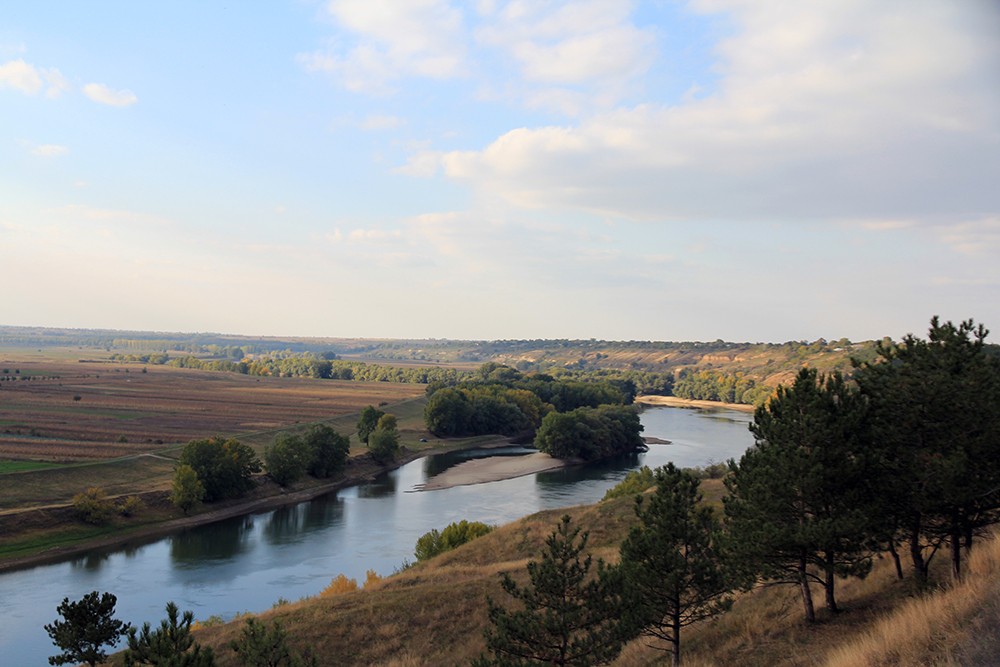Once a busy waterway, the Dniester is passing away. There are many reasons for that. Among principal, ecologists single out a great number of dams in Ukraine and Pridnestrovie, the overregulation of the river flow, water pollution and decreased ability for self-purification, loss of natural spawning areas, sand-gravel production.
Today, 14 March, on the International River Day Novosti Pridnestrovya had decided to learn how the problems of the Pridnestrovian waterway are handled.
According to the deputy minister of agriculture and natural resources, Yelena Nezhinskaya, last year the Dniester's level fell to 8.4 metres. «It almost hit a critical point of 8.3 metres," noted the deputy minister. «A whole island has emerged in Bendery; there are islands in Grigoriopol; in some places the river can be crossed on foot. This is all due to the work of hydraulic installations. Ukraine does not provide the river level we want.»
As a result of steady climate warming and reduced precipitation in the Carpathian Mts, where the Dniester has its rise, today the river's water level in Ukaraine is lower than its optimal mark.
«We are not expecting a spring tide' All the water that will flow down from the Carpathian Mts as a result of snowbreak will be accumulated in Ukraine's water reservoirs. If earlier there was a slight possibility of the river's overflow and the arrival of fish for natural spawning, today we are not even expecting that," underscored Yelena Nezhinskaya.
Seeding
Because of shallowing, the Dniester has been losing its original biodiversity. If earlier there was sturgeon and stellate sturgeon, today they have been replaced with non-exploited species, such as stickleback and bitterling. The loss of natural spawning areas affects qualitative and quantitative composition of fish. It is chiefly due to the Dniester hydroelectric power chain, which is located upstream in Ukraine and which has changed the river's temperature and hydraulic conditions.
«The overregulation of water reservoirs by itself affects fish. Temperature falls due to hydraulic installations and spawning conditions are getting less convenient. Ukraine's industrial fishery is at a high level. It is strictly regulated, and we can see that there are not species here that must migrate up the river to spawn," noted Yelena Nezhinskaya.
Pridnestrovie solves this problem by compensating seeding, which our Moldovan neighbours, unfortunately, do not do. «We considered this issue at meetings of expert working groups. We were told that Moldova had stocked the Dniester with fish four years ago, but there were no supporting documents. We do not know what they seed the river with, aswell as the quantitative structure of seeding," said the deputy minister.
According to her, nearly 200,000 rouble is annually allocated from the Ecological Fund for compensating seeding. It is planned to seed the river with about 40 tonnes of fry this year. «We seed the species that do not spawn in natural conditions: silver carp and grass carp. The Moldavian GRES [power plant] seeds the Kuchurgan reservoir with chiefly herbivorous species," explained Yelena Nezhinskaya.
Sand-gravel production
The loss of natural spawning areas is closely connected with the large-scale extraction of sand-gravel from the river's bottom in the 1940−70s, which was used as construction material. At the end of the 1980s, ecologists came to conclusion that further sand-gravel production might damage the Dniester and the extraction ceased. However, dredging activities are still performed to ensure safe navigation.
«Our law does not clearly prohibits sand-gravel production. We say there are certain terms for the execution of the works: securing safe navigation. Bendery's river port measures the river's water level and, when necessary, the rifts produced by the river are cleared. This year, for instance, the port will be removing an island," noted the deputy minister.
She underscored that the extraction of sand from the bottom would be disastrous for the river, which is losing its natural hydrofilter in this way.
«Water reservoirs in Ukraine and Dubossary have completely blocked the flowing of gravel and sand, which is why there is no considerable increase in sand here. We can see today a steady lowering of water-bearing horizons. This is why we limit well-boring activities to maintain the water-bearing horizon because extensive water withdrawal may be related to conical depressions and water may change its course," said Yelena Nezhinskaya.
Water quality and the reconstruction of treatment facilities
The river is still capable of self-purification for the time present and the quality of water complies with norms. However, a drawdown of the Dniester's level may significantly affect this indicator. It is alarming in this respect that the most part of treatment facilities, built in the last century, needs upgrading. «Therefore, it is possible to maintain the quality of water by not dumping waste water to the river," underscored the deputy minister.
Today the Ministry of Agriculture and Natural Resources and the Ministry of Regional Development, Transportation and Communications are working out a long-term programme for the reconstruction of treatment facilities.
«We are especially concerned about the state of countryside treatment facilities. This year we plan to reconstruct them in Slobodzeya and Gidirim village, Rybnitsa district. There is also a big project for the reconstruction of Dubossary's facilities, which is implemented in cooperation with German invesors. Last year we built treatment facilities in Ulm. This must be done in stages. Despite being in financial straits, we are doing our best to accomplish everything," said Yelena Nezhinskaya, adding that this year it is planned to exercise quarterly control instead of biannual over all facilities.
International cooperation
Ecological preservation must have no borders, ecologists say unanimously. But it is difficult to do in practice, For many years Pridnestrovie has not been recognised by its neighbours as a full-fledged partner in terms of ecology, although the corresponding work, including the preservation of the Dniester, is regularly performed in our country. Now the situation has slightly changed. Last year Pridnestrovie's agricultural ministry initialled an ecological preservation agreement with its Moldovan counterpart.
«We have arranged that Pridnestrovie and Moldova are ready to sign an interagency agreement. Since 2010 we have had an agreement between our and Moldova's met offices on the exchange of information about the Dniester's water level and other indicators. At the same time, they provide us with the information about water pass from Ukraine, about planned water removing and its volume because Ukraine does not inform us," stated Yelena Nezhinskaya.
The Pridnestrovian and Moldovan sides have already drafted agreements. They will be given detailed consideration at a meeting of expert working groups. The agreement is expected to particularly specify exchange of information between the met offices of Moldova and the PMR, joint inspection of treatment facilities and cooperation of Pridnestrovian and Moldovan fish conservation agencies.
«Ukraine is not going to join these agreements and, in general, is reluctant to negotiate. Besides, Ukraine intends to launch one more hydraulic installation. And with one more water reservoir, we are going to simply lose the river," concluded the deputy minister.








